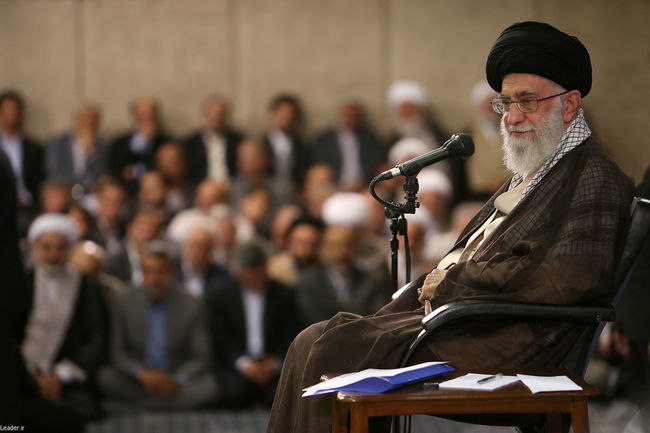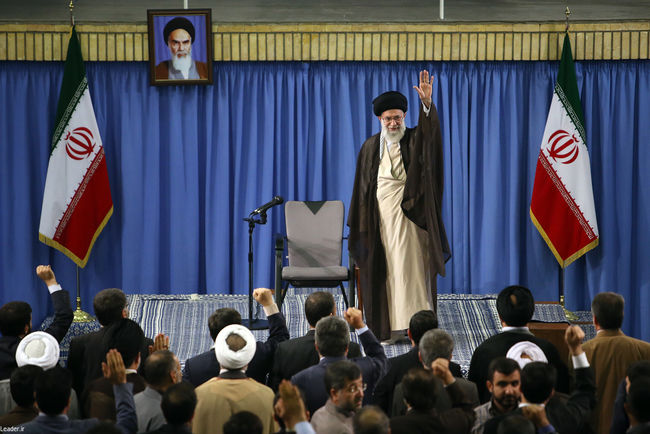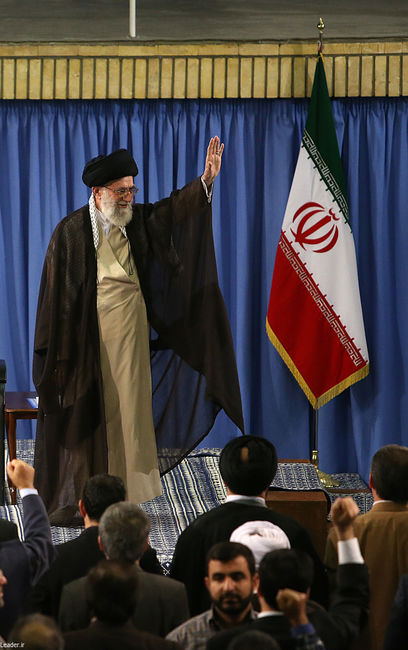Leader of the Islamic Revolution Ayatollah Seyyed Ali Khamenei, in a meeting on Saturday with more than 1,000 professors and faculty members of universities from across the country, described the role of academics in teaching and training an industrious, faithful and progressive generation as unique. Underscoring the necessity of steering clear of marginal affairs in scientific environments, the Leader said, “The country’s scientific speed should not slow down for any reason.”
During the more than two-hour-long meeting, the Supreme Leader listened to views and proposals offered by a number of university professors. Referring to the natural influence of professors on the hearts and minds of students as an exceptional opportunity, the Leader said, “Benefit from this very big opportunity for training youths [who would be] ‘faithful, with national zeal, motivated, revolutionary, studious, ethical, courageous, self-confident and hopeful in future’ and educate and train powerful arms for the progress of the dear Iran.”
Ayatollah Khamenei said being independent of foreigners, correct understanding of the country’s conditions and direction [of movement], and sensitivity and firmness against any harm to the country’s independence were among other necessary characteristics for the younger generation. The Leader added, “The esteemed professors must bring up such a generation through [the influence] of their own methods and conduct.”
The Supreme Leader described the professors as commanders of the soft war, telling them, “Exactly like the [military] commanders of eight years of Sacred Defense (1980-1988 Iraq war on Iran), command and lead young students, that is, the officers of the soft war, through objective presence in this vital and profound struggle, because this arena is also a ‘Sacred Defense’ [in its own right].”
Ayatollah Khamenei expressed satisfaction with the presence of 70,000 faculty members in universities, saying, “The majority of these professors are ‘faithful, religious and loyal to the fundamentals of [the 1979 Islamic] Revolution’, which is a very important issue and a source of honor for the country.”
Ayatollah Khamenei called on officials at the Ministry of Science, Research and Technology and the Ministry of Health, Treatment and Medical Education to appreciate the value of faithful and revolutionary professors, saying: “The elements that are not scared of extensive, sly, and mostly hidden propaganda, and are fulfilling their important duties, must be paid attention and praised.”
The Supreme Leader said Iran standing 16th in global scientific ranking is a result of relentless efforts undertaken over the past 10-15 years in universities and scientific centers, adding: “The enthusiasm-inspiring scientific speed, which has brought Iran this honor, has slowed down today and officials must double their efforts so that the scientific progress movement would not lose steam and would pick up speed in proportion to the country’s need.”
Offering a pathological analysis of the factors that have slowed down the speed of the country’s scientific progress, Ayatollah Khamenei sharply criticized undue attention to marginal issues and politicization in scientific environments, saying, “The environment in university must be an environment of political understanding, [as well as] political knowledge and awareness, but politicization and focus on marginal issues will deal a serious blow to the main task of universities, which is [making] scientific efforts and progress.”
As an example of politicization at universities, Ayatollah Khamenei highlighted the issue of recent row on granting scholarships, describing it as one of the most erroneous measures taken in the past couple of years.
“Accurate investigations show that the issue of scholarships was not like what was played with by newspapers. However, even if it was so, the privileges granted to some people against the law must have been abrogated through legal channels instead of making a fuss [over it].”
Ayatollah Khamenei described politicization as poisonous to scientific environments, and while expressing regret that some people were wronged in the issue of scholarships, added, “The poison that was injected to universities in this issue [of scholarships] stemmed from an attitude based on politicization and, unfortunately, was both illegal and against the law, and against foresight, and against ethics.”
In another part of his speech, Ayatollah Khamenei spoke about the necessity of serious efforts by officials for changing humanities courses in the country.
The Leader added, “This necessary change needs both internal dynamism inside the universities and such centers as the Supreme Council of Cultural Revolution and the Humanities Transformation Council, and external support from responsible organs.”
“Thanks to God, the internal dynamism already exists and responsible organs are required to make operational the theoretical efforts made to change humanities, and execute the decisions of the Humanities Transformation Council.”
The fourth point in the Supreme Leader’s speech was attention to “budget allocation to research sector out of the country’s public budget.”
The Leader referred to his own repeated emphasis in this regard in the past years, and expressed regret about non-allocation of the expected share of research sector from budget, saying: “In the Vision Plan, a four-percent share of the public budget has been considered for research. Such [budgetary] allocation cannot be realized in the short run, but the nearly two-percent share of the research sector from public budget should be realized. Meanwhile, these budget [allocations] and financial resources for the research sector should be consumed correctly and in the right place.”
The necessity of implementing the country’s comprehensive scientific roadmap was another point mentioned by the Supreme Leader in his address to higher education officials and university professors.
Referring to the endorsement of the comprehensive scientific roadmap by experts, Ayatollah Khamenei said the first step towards implementation of this important document was building a suitable discourse.
“As the issue of the country’s scientific progress has turned into a common discourse and become a scientific current, with regard to the [implementation of] the comprehensive scientific roadmap, university professors and managers and students are required to be kept abreast of the details of this roadmap, and the comprehensive scientific roadmap should become an established discourse.”
To that effect, the Supreme Leader highlighted the “higher education planning document,” and while referring to the necessity of completion and implementation of this document, added, “The country’s territorial and scientific planning means recognition of and making decision on the capacities of universities and [academic] disciplines before determining priorities in which it is possible to invest specifically for fundamental advances.”
Ayatollah Khamenei said having a large-scale view of the growing number of students at different levels of post-graduate education is an important advantage and a major task assigned to the Ministry of Science, Research and Technology.
“By having a large-scale view and through correct planning and general guidance, the Ministry of Science, [Research and Technology] should orientate the result of the work and effort of students at these educational levels towards cutting the knots [that exist] in the country, because otherwise, the country’s resources and facilities will be squandered,” said the Supreme Leader.
Ayatollah Khamenei described the role of professors and scientific management organs of the country in countering the enemy’s plots as important, saying, “The enemies’ objective behind sanctions is not the nuclear issue, nor issues like human rights and terrorism, because they are the main terrorism-nurturing and anti-human rights centers. Their objective is to prevent the Iranian nation from reaching the civilizational status it deserves, which by precisely knowing our position and status, it is necessary [for us] to proceed with the country’s honorable drive, which in this process, professors and scientific organs have a prominent role [to play].”
At the beginning of this meeting, seven university professors expressed their views as follows:
-Dr. Mohammad Mehdi Nayebi, professor of electrical engineering, Sharif University of Technology,
-Dr. Mohammad Hossein Rajabi Davani, head of Hadith Velayat Research Center at Imam Hussein University,
-Dr. Mohammad Qanadi Maraghe’i, head of the Nuclear Sciences and Technology Research Center and veteran nuclear scientist,
-Dr. Hossein Salimi, professor at Allameh Tabatabaei University,
-Dr. Jafar Hezar Jaribi, sociologist and professor at Allameh Tabatabaei University,
-Dr. Hojjatollah Abdol-Maleki, professor of Islamic teachings and economy,
-Dr. Sadaf Alipour, associate professor at Iran University of Medical Sciences.
The main points expressed by these academics included:
-The necessity of accelerating industrial development to take practical steps in the field of scientific research and generation of wealth from the chain of science activities,
-The significance of strengthening the genuine private sector,
-The necessity of formulating an industrial strategy for the country,
-The necessity of defining and stabilizing theoretical principles and fundaments of the thoughts of Imam Khomeini and the Supreme Leader as fixed principles and the roadmap of the Islamic Revolution,
-The necessity of training experts specializing in the thoughts of Imam Khomeini in order to counter efforts made to distort his thoughts,
-Elucidating the country’s significant advances in the nuclear industry and emphasis on the necessity of research and development in this industry,
-The necessity of elucidation of Shia, rational, civilization-making and science-oriented Islam versus violent and destructive Islam,
-The necessity of revising humanities’ curricula based on the principles of up-to-dateness, value-orientation and practicality,
-The necessity of theoretical synergy in humanities,
- The necessity of educating professional behavior and upgrading the quality of education in the country,
- Emphasis on the significance of modern treatment methods based on modern technologies,
- The necessity of providing professional manpower for the implementation of the country’s healthcare transformation plan,
-Taking advantage of all major economic capacities in the country, including the agriculture sector,
-The necessity of benefiting from the potential of the elites in the country,
-Taking advantage of the opportunity of sanctions to cut dependence on oil sales, and
-The necessity of paying special attention to the element of culture in the Resistance Economy and attention to educational and promotional measures in this regard.



